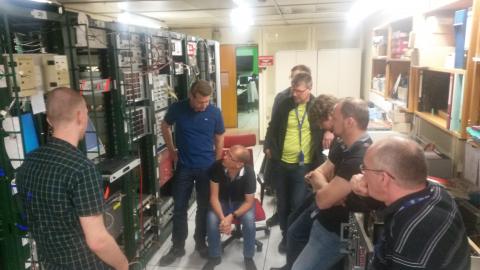Upgrade of the Magnet Safety System for Experimental Magnets
The Magnet Safety System (MSS) is a critical system that ensures the safety of experimental magnets, both warm and superconducting. It was developed within EP-DT for the LHC experiments, starting at the end of the 90’s, in the framework of the overall Magnets Control Project (MCP).

In 2012 a new project was launched within EP-DT in order to develop a modern and improved safety system, the MSS2, applicable to very different types of magnets, from test beam magnets and experimental magnets at the SPS North Area (COMPASS, NA61, CMS & ATLAS test beams) to the large LHC experimental magnets (ALICE, ATLAS, CMS, LHCb). The system is based on the CompactRIO(link is external) platform of National Instruments: the user programmable FPGA takes care of the safety logics, while a real time processor allows for monitoring and logging. The visualisation of the status and actions of the MSS2 system is integrated into the MCP supervisory layer.
After an initial period of design and prototyping, the new system was deployed initially for the COMPASS and CMS test beam superconducting magnets, then for the warm magnets of ALICE and LHCb (2013 - 2014) and finally for the CMS solenoid (2017) and ATLAS solenoid and toroids (2016, 2017). The MSS2 has also been deployed on magnets that were showing an abnormal behaviour (VTX1&2 magnets for NA61 and very recently the Morpurgo magnet for the ATLAS test beam): in both cases the improved diagnostic capabilities have allowed to verify that the magnets were healthy and that nominal working conditions could be safely re-established.
The MSS2 project is now in its operations and maintenance phase, ready to be deployed on any additional experimental magnets that may need it.
